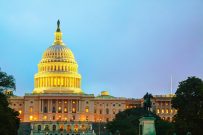Using Delegation to Promote Deregulation
I recently published an essay in Regulation magazine proposing a reform that would promote deregulation. The idea is to establish an administrative agency with the power to deregulate – to identify undesirable regulations passed by other agencies and to repeal those regulations.
Here is the intro:
For those who favor strong limits on regulation, the last 100 years in the United States have been disappointing. During this period, regulation grew almost continually. One of the reasons for that growth is the delegation of legislative power to administrative agencies, which allows those agencies to who write regulations with little oversight from elected lawmakers. To rein in regulation, advocates of limited regulation argue that Congress’s delegation of its legislative authority must be restrained.
Unfortunately, reforms that attempt to eliminate or limit delegation are unlikely to be enacted. The practice of delegation has become a basic aspect of our political system. Its prevalence in the modern world is no accident. It occurs because delegation is popular with so many of the prevailing powers, including Congress, the president, the agencies, and those who favor regulation.
But proponents of limited regulation need not despair. While delegation certainly promotes regulation, it can also be used to promote deregulation. Congress could create an administrative agency that is given the power to pass deregulations – rules that either eliminate regulations or move the country back to a system of property and markets. By employing delegation in an effort to reduce regulation, proponents of limited regulation will not be fighting against one of the fundamental forces of our modern political system, but instead be employing that force for a beneficial purpose.
For example, this deregulatory agency could identify an environmental regulation that is particularly problematic and attempt to repeal it. Ultimately, the EPA might object to this action and the President would have to decide the matter. If Presidents, including pro-regulation Presidents like Obama, get to decide the issue, would the deregulatory agency have any effect? Here is my discussion from the essay:
There are strong reasons to believe that the deregulatory agency would have an important effect. Administrative agencies have significant influence on administrations, causing presidents to approve or allow actions that they seemingly would not have permitted otherwise. Just as such agencies have been able to promote regulation under presidents who purport to favor less regulation, so they are likely to further deregulation under presidents who generally favor additional regulation.
How would this happen? Even the most pro-regulatory president does not necessarily oppose all deregulation. President Obama, for example, issued executive orders promoting the elimination of undesirable regulations and appointed cost-benefit analysis advocate Cass Sunstein to head the Office of Information and Regulatory Affairs (OIRA). Whether a president will support a particular deregulation will depend on the policy arguments and the political support for the deregulation.
The deregulatory agency will seek to identify the deregulations that make the most sense from a policy and political perspective. By proposing deregulations that pursue policies that the president supports, the agency would greatly increase the chance that the president will approve the deregulation. The agency would also have an incentive to use its knowledge of the political environment to develop deregulations that will have political support or at least will avoid significant political backlash. Overall, then, the deregulatory agency’s expertise, time, and incentives would result in it proposing many more deregulations that are likely to be approved by the president than would be proposed in the absence of the agency.
The deregulatory agency will not turn a proregulatory administration into a deregulatory one. Instead, it will make a proregulatory administration a bit more – perhaps a good bit more – deregulatory. Similarly, the deregulatory agency will also make a less regulatory administration or a deregulatory administration more deregulatory.

